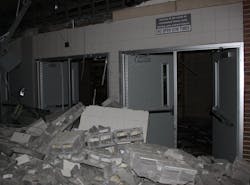Students are returning to class after a mechanical room explosion at Carmel High School in Carmel, IN, caused extensive damage to the school’s roof and injured two people.
The Dec. 26 explosion was attributed to a natural gas leak that emerged during maintenance on two boilers.
“At this point, it appears that there was no boiler malfunction,” the Indiana Department of Homeland Security explains in a statement. “Workers were doing routine service and a natural gas leak occurred, leading to an explosion during the reigniting process.”
Students were on winter break when the explosion occurred, though about 100 people were in the building at the time, Superintendent Michael Beresford told the Indianapolis Star.
None of the students on-site were injured. A high school maintenance employee and a contractor were taken to the emergency room to be treated for burns, the Carmel Fire Department added in a statement.
Much of the cleanup was completed by the end of winter break, though the field house, freshman gym and volleyball locker room remain closed, as do one side door and parking lot.
Reduce Your Building’s Risk of Explosions
The Carmel High School explosion was not due to a boiler malfunction, but the same cannot be said for other recent incidents.
Over-pressurized gas mains stemming from faulty work orders were cited in an investigation into a wide-ranging series of fires and explosions in Massachusetts in September.
A 2017 explosion at Minnehaha Academy in Minnesota that killed two people was attributed to a failure to close gas shut-off valves upstream from a meter that was being disconnected.
“When fuel systems and combustion equipment are at issue, the devastation can be massive,” writes John R. Puskar in a column for the National Board of Boiler and Pressure Vessel Inspectors. Puskar offers these tips to help avoid an explosion at your facility.
1. Don’t skimp on pre-repair planning.
Any projects involving gas piping have to be carefully planned out ahead of time, Puskar explains.
“The most dangerous part of gas piping projects is the reintroduction and start-up of the equipment,” he says. The explosion at Carmel High School occurred during the reignition phase, when gas has started flowing again. Puskar recommends picking up a copy of NFPA 54: The National Fuel Gas Code if you have any piping work planned.
2. Keep up with testing.
Some states have boiler safety laws that require inspections and testing, but even then, the law may not include fuel train safety devices, Puskar says.
Preventive Maintenance Checklist
Preserve the integrity of your roofing, lighting, HVAC and plumbing with this preventive maintenance checklist.
Make sure your equipment has been inspected on time, but understand that a jurisdictional inspection or state certificate doesn’t mean that you’ll never have problems. If you’re not sure what needs to be inspected, consider reaching out to a consultant or engineer who can review your system and help you develop a self-auditing program.
Regular checks of safety interlocks and switches are also frequently neglected, especially when maintenance budgets are stretched, states Puskar: “When we come to a site where regular testing has not occurred, there is likely to be at least one switch or device that is failed on each piece of equipment. This is like having the brakes out on one wheel of a car.”
3. Remember code compliance isn’t retroactive.
Puskar recommends a gap analysis for any older equipment. You may technically be in compliance with an older version of code, but safety practices may have been updated since then.
[Related: Ways Your Fire Safety System Could Be Falling Short]
Find out where you could be falling short and develop a roadmap for getting up to date.
4. Remember the human factor.
Nearly 40 percent of boiler deaths and accidents can be attributed to human error or bad maintenance, Puskar says.
Help BUILDINGS Shape 2019!
What BUILDINGS resources are most valuable to you? What would you like to see us provide?
Please take our short (under 2 minutes) survey - just 5 short questions.
Thank you!
How strong is the safety culture in your facility? Can you improve it? If everyone is taking the problem as seriously as they should be, can you find some affordable training to make sure everyone is up-to-date on safe and reliable boiler operations?
A special focus on troubleshooting techniques and staging mock emergency drills are critical, Puskar recommends.
Your team also may not have the skills or adequate staffing levels to do maintenance and repairs on combustion systems in-house, and hiring a contractor is a good way to make sure your system is being serviced with the proper tools and practices.
[Be prepared: Emergency Management Planning]
However, you should still teach yourself enough about it to be able to properly vet contractors and choose the right one. Look at the expertise of the person who will actually be servicing your equipment, not just the reputation of the company as a whole.
5. Maintain good documentation.
Keep panel drawings, operational manuals, preventive maintenance schedules and other crucial documents in one central location where whoever is servicing your equipment can easily find it. No one should be using your equipment as a learning experience.
Two handpicked articles to read next:
About the Author
Janelle Penny
Editor-in-Chief at BUILDINGS
Janelle Penny has been with BUILDINGS since 2010. She is a two-time FOLIO: Eddie award winner who aims to deliver practical, actionable content for building owners and facilities professionals.


